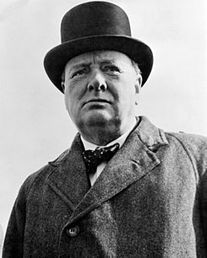
Winston Churchill
When I was fourteen years old I told my 8th grade literature arts teacher that I wanted to study leaders as part of a class assignment and asked her who she thought I should study. She replied very directly, “You need to study Winston Churchill.” As far as I remember, that was the end of the conversation. I’m not sure I knew much about Churchill at the time and I’m not sure why my teacher felt so strongly that the fourteen year old me should study the life of a leader from another nation and another era. Yet, I did and I learned. Some lessons came then as an 8th grader and others I have learned since that I find applicable to any leader.
1. Your attitude in adversity is crucial: Winston Churchill, the dynamic leader who presided over Great Britain’s ultimate victory in the Second World War, may have understood this principle more than most. It was Churchill who set the example of determination, resiliency and a can-do attitude even during some of Britain’s darkest days. His countrymen followed suit successfully protecting their Island Nation from foreign Nazi rule. Churchill once said, “A pessimist sees the difficulty in every opportunity; an optimist sees the opportunity in every difficulty.” His attitude and resiliency in spite of adversity was unparalleled and contagious.
2. External circumstances need not define us: Churchill was born into an aristocratic English family but was largely ignored by his parents during his formative younger years. In school he was often considered a failure by his teachers and struggled to overcome a speech impediment for a good portion of his life. He was no prodigy by today’s standards. His circumstances and limitations could have been used as crutches to excuse him from accomplishing all that he did in his life, but he worked through them and I find that inspiring. Perhaps this is why later in life he was quoted as saying, “Continuous effort- not strength and intelligence- is the key to unlocking our potential.” His story epitomized that truth.
3. Power lies in strong moral character: Churchill remarked, “A man does what he must- in spite of personal consequences, in spite of obstacles and dangers and pressures- and that is the basis of all human morality.” On another occasion he stated, “To build may have to be the slow and laborious task of years. To destroy can be the thoughtless act of a single day.” This thought is applicable to one’s character and by extension the right one earns to lead. When integrity fails, the foundation upon which a leader stands immediately crumbles from within. Unfortunately examples of this are easy to find today, but there are also many great examples of those who have virtuously constructed greatness in themselves and those around them. It is our task to learn from their good and bad examples.
4. Never give in: Churchill often returned to the school of his youth to offer encouragement to the students. In October of 1941 he had his first occasion returning to the Harrow School, the institution where he had faced obvious challenge and hardship. I believe his own experience within its halls did not escape him. He delivered a message he had applied to his life, to his country, and to every aspect of his leadership. He said, “This is the lesson: never give in, never give in, never, never, never, never- in nothing, great or small, large or petty- never give in except to convictions of honor and good sense. Never yield to force; never yield to the apparently overwhelming might of the enemy.”
A study of the great leaders of the past can enrich our lives and enhance our own understanding of what it means to successfully lead. This suggestion given to me by a thoughtful teacher helped me to become a better leader. Even at the raw age of fourteen, the assignment is still impacting my life. It is within the power of every teacher and leader to inspire greatness in their students, even in a simple way such as making those they teach look back and learn applicable lessons from the great leaders of days gone bye.
1. Your attitude in adversity is crucial: Winston Churchill, the dynamic leader who presided over Great Britain’s ultimate victory in the Second World War, may have understood this principle more than most. It was Churchill who set the example of determination, resiliency and a can-do attitude even during some of Britain’s darkest days. His countrymen followed suit successfully protecting their Island Nation from foreign Nazi rule. Churchill once said, “A pessimist sees the difficulty in every opportunity; an optimist sees the opportunity in every difficulty.” His attitude and resiliency in spite of adversity was unparalleled and contagious.
2. External circumstances need not define us: Churchill was born into an aristocratic English family but was largely ignored by his parents during his formative younger years. In school he was often considered a failure by his teachers and struggled to overcome a speech impediment for a good portion of his life. He was no prodigy by today’s standards. His circumstances and limitations could have been used as crutches to excuse him from accomplishing all that he did in his life, but he worked through them and I find that inspiring. Perhaps this is why later in life he was quoted as saying, “Continuous effort- not strength and intelligence- is the key to unlocking our potential.” His story epitomized that truth.
3. Power lies in strong moral character: Churchill remarked, “A man does what he must- in spite of personal consequences, in spite of obstacles and dangers and pressures- and that is the basis of all human morality.” On another occasion he stated, “To build may have to be the slow and laborious task of years. To destroy can be the thoughtless act of a single day.” This thought is applicable to one’s character and by extension the right one earns to lead. When integrity fails, the foundation upon which a leader stands immediately crumbles from within. Unfortunately examples of this are easy to find today, but there are also many great examples of those who have virtuously constructed greatness in themselves and those around them. It is our task to learn from their good and bad examples.
4. Never give in: Churchill often returned to the school of his youth to offer encouragement to the students. In October of 1941 he had his first occasion returning to the Harrow School, the institution where he had faced obvious challenge and hardship. I believe his own experience within its halls did not escape him. He delivered a message he had applied to his life, to his country, and to every aspect of his leadership. He said, “This is the lesson: never give in, never give in, never, never, never, never- in nothing, great or small, large or petty- never give in except to convictions of honor and good sense. Never yield to force; never yield to the apparently overwhelming might of the enemy.”
A study of the great leaders of the past can enrich our lives and enhance our own understanding of what it means to successfully lead. This suggestion given to me by a thoughtful teacher helped me to become a better leader. Even at the raw age of fourteen, the assignment is still impacting my life. It is within the power of every teacher and leader to inspire greatness in their students, even in a simple way such as making those they teach look back and learn applicable lessons from the great leaders of days gone bye.
 RSS Feed
RSS Feed